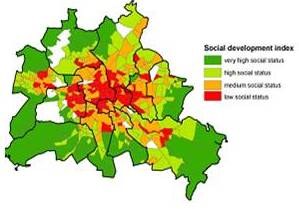Environmental Justice in Germany?
Environmental justice in Germany?
A spatial approach to study social inequalities in living environments
(German: Umweltgerechtigkeit in Deutschland? Ein Analyse der sozialräumlichen Ungleichheiten im Wohnumfeld)
The distribution of environmental pollution and social status has been studied for quite some time in the English-speaking countries. In Germany, however, the concept has only recently gained attention. We study inequalities in Germany and in particular in Berlin including environmental pollution and environmental resources, or in other words, ecosystem services. We apply a spatially explicit multi-criteria approach to analyse noise pollution and vegetation in the neighbourhood on the level of "Lebensweltlich orientierten Räumen" in the city of Berlin, Germany.
We identify spatial patterns of environmental and socioeconomic status on a city-wide level and focus on hotspots of environmental injustice. Future work will seek to extend the Berlin-wide analysis to a country-wide level. Furthermore, we will try to link quantitative approaches, such as spatial clustering analysis, multi-criteria analysis and geographically weighted regression, with qualitative approaches of the individual perception of environmental justice.

Principal Investigator:
Tobia Lakes (Humboldt-Universität zu Berlin)
Project Investigators:
Heinz-Joseph Klimeczek (Senatssverwaltung für Gesundheit,
Umwelt und Verbraucherschutz, Berlin)
Katharina Spiess (German Institute for Economic Research (DIW))
Jan Göbel (German Institute for Economic Research (DIW))
Alexander Krämer (University of Bielefeld)
Maria Brückner (Humboldt-Universität zu Berlin)
Funding:
Senatsverwaltung für Gesundheit, Umwelt und Verbraucherschutz, Berlin
